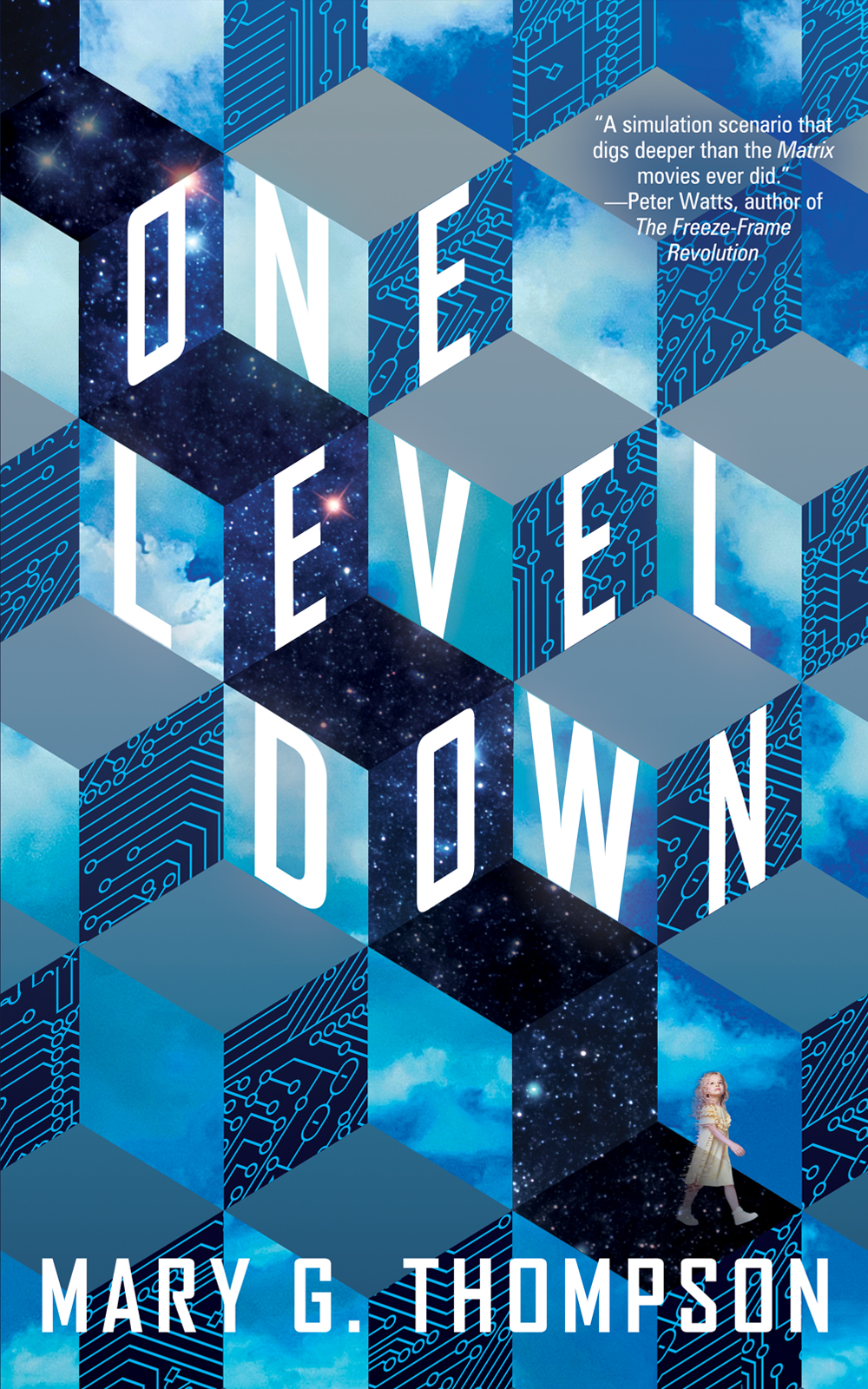 Mary G. Thompson’s new book, One Level Down, follows Ella, a child constructed as part of a simulated universe on the planet Bella Inizio, where people can upload themselves, leaving their bodies behind in the real world. The simulation is controlled by Phil Harkin, Ella’s creator-coder, whom she refers to as “Daddy.” Harkin, or Daddy, was scarred by the loss of his wife and daughter in the real world. Now, as master of a simulated universe, he’s turned vengeful and even murderous to anyone who confronts him.
Mary G. Thompson’s new book, One Level Down, follows Ella, a child constructed as part of a simulated universe on the planet Bella Inizio, where people can upload themselves, leaving their bodies behind in the real world. The simulation is controlled by Phil Harkin, Ella’s creator-coder, whom she refers to as “Daddy.” Harkin, or Daddy, was scarred by the loss of his wife and daughter in the real world. Now, as master of a simulated universe, he’s turned vengeful and even murderous to anyone who confronts him.
He decides whether people in the simulation can have babies, and if someone displeases him, he can “delete” them. But his ultimate cruelty is his subjugation of Ella. Though she’s lived for fifty-eight years, her body remains that of a five-year-old. And if she acts older than a kindergartener, Daddy makes her suffer for it.
There’s a rich pool of narrative influences to this sci-fi, fairytale dystopia: Frankenstein, Pinnochio, Peter Pan, Black Mirror, DEVs, to name a few. Thompson does a wonderful job of weaving setting, characterization and plot together. It’s no small task to introduce a reader to a world with data centers on multiple colonized planets which each contain simulated universes, none of which necessarily follow the laws of physics and all of which suffer from periodic glitches like the disappearance of random socks, trucks and every bird on the planet. Alongside such complicated worldbuilding are believable characters who exist in one or more forms: simulated, uploaded and physical. And on top of that, Thompson tells an intriguing, personal story which is constantly moving forward.
Phil Harkin’s mercurial nature and tyrannical control over the people of the Bella Inizio resembles an unforgiving god, striking anyone down who questions him. Like many victims, Ella blames herself for her oppressor’s cruelty. Her desire to escape either to another simulated universe or to be deleted isn’t just an escape from her personal suffering, but also from her role as Daddy’s eternal replacement daughter.
Harkin’s sadism is just a symptom of the simulation’s problem. The serious glitches are bigger than missing birds and trucks; they’re human, ethical issues. The people of Bella Inizio complain about their missing socks, but don’t raise a peep of protest about disappeared people. All the adults know Ella is a suffering woman trapped in a child’s body. But as long as Daddy lets them have their homes and families on the sunny simulated planet, they’ll look the other way. Every day is a new day and the past is forgotten in a beautiful New Beginning as the name Bella Inizio seems to suggest.
Or does the planet’s name indicate the beginning of a B-Ella, her second version, designed solely for her creator’s pleasure? The ethics underpinning this act are descendants of Ursula K. Le Guin’s famous story “The Ones Who Walk Away from Omelas” in which the people of Omelas can enjoy peace, prosperity and happiness as long as they allow for the misery of a solitary child who lives trapped in a cell filled with his own excrement. One Level Down is less of an ethical allegory than Le Guin’s story, but “Omelas” could provide a founding principle for Bella Inizio’s tyrannical world order.
In the final seventy pages of the book, Thompson’s writing style holds up well, even though the story and characterization are weaker than the first half. Such an ending makes for frustrating reading that begs the question why the final part couldn’t be detached and expanded into two separate novellas. That said, if Thompson ever planned to take those final pages and expand them into one or two sequel novellas, I’d certainly want to read them. What I’m getting at is that readers shouldn’t let the just-passable end take away from the artistry and beauty of the first hundred pages. This book forces us to ask hard questions. How much comfort are we willing to risk to stand up for our principles? How much cruelty and violence to others will we tolerate in a trade off for our personal gain? Now, more than ever, this is the kind of soul-searching we need to do.
Publisher: Tachyon Publications
Publication date: April 1, 2025
Reviewed by David Lewis
David Lewis’s reviews and fiction have appeared or are forthcoming in The Los Angeles Review of Books, Joyland, Strange Horizons, The Weird Fiction Review, Ancillary Review of Books, 21st Century Ghost Stories Volume II, The Fish Anthology, Willesden Herald: New Short Stories 9, The Fairlight Book of Short Stories, Paris Lit Up and others. Originally from Oklahoma, he now lives in France with his husband and dog.
